Your environment plays a crucial role in your journey to recovery from substance abuse. As you embark on the path to sobriety, understanding how your surroundings impact the detoxification process and long-term recovery is essential. Recent studies have shown that a supportive, structured environment can increase success rates in addiction treatment by up to 40%. Whether you’re considering medical detox for alcohol, opioids like fentanyl, or require dual diagnosis treatment, the setting in which you heal matters. This article will explore the various ways your environment affects detox and recovery, from the initial stages of medical intervention to ongoing therapy like CBT, empowering you to make informed decisions about your treatment journey.
Together, let’s embrace the journey to recovery and the promise of a new beginning. Call us at (833) 819-6066 today or reach out online.
The Impact of Environment on Addiction
Enabling Environments
Our environment and social surroundings play a pivotal role in shaping addictive behaviors. Studies show that factors like peer influence, family dynamics, and access to substances can significantly impact an individual’s risk of developing addictions, especially among adolescents. For instance, adolescents exposed to environments where gateway drugs like alcohol, nicotine, or marijuana are readily available are more likely to progress to harder, illicit drug use.
Triggering Surroundings
Beyond initial substance exposure, environmental cues and triggers can also contribute to relapse and perpetuate addiction. Certain environments may be associated with past drug use, triggering cravings and compulsions. Stress, trauma, and dysfunctional family dynamics can also create conditions that enable addictive behaviors. Addressing these environmental factors is crucial for effective recovery.
Supportive Environments for Recovery
Conversely, a supportive and structured environment can significantly improve the chances of successful recovery. Professional treatment facilities provide a safe, controlled setting for medical detox and comprehensive care, minimizing exposure to triggers and high-risk situations. Therapeutic interventions like cognitive-behavioral therapy (CBT) equip individuals with strategies to cope with environmental stressors and maintain sobriety.
Fostering a positive, substance-free environment is essential for lasting recovery. Family involvement and support systems can create a nurturing atmosphere conducive to healing and personal growth, mitigating the impact of environmental factors that may contribute to relapse.
Navigating the Challenges of Detox
The Detox Journey
Detoxification, or detox, is the crucial first step in overcoming substance addiction. It involves safely and effectively ridding the body of drugs or alcohol, allowing it to readjust to a sober state. However, this process can be incredibly challenging both physically and emotionally. According to a study, 40-60% of individuals relapse within the first year after treatment, underscoring the importance of proper support during detox.
Managing Withdrawal Symptoms
One of the primary obstacles during detox is the onset of withdrawal symptoms. As the body becomes dependent on a substance, it adapts to its presence, and sudden removal can trigger a range of unpleasant and potentially dangerous side effects. These can include seizures, delirium tremens, psychosis, and even life-threatening complications. Attempting self-detox at home without medical supervision is strongly discouraged due to these risks.
Addressing Emotional Challenges
In addition to physical symptoms, detox can also bring about emotional turmoil. Individuals may experience irritability, anxiety, depression, mood swings, and intense cravings as their bodies adjust to the removal of substances. These emotional challenges can be overwhelming and increase the risk of relapse if not properly managed.
The Importance of Professional Support
To navigate the complexities of detox safely and effectively, seeking professional support is crucial. Medical detox programs provide a controlled environment with 24/7 monitoring by healthcare professionals. They can administer medications to alleviate withdrawal symptoms, provide counseling and therapy to address underlying emotional issues, and develop personalized aftercare plans to support long-term recovery.
Sub-acute treatment services offer a comprehensive approach, combining medical detox, residential treatment, dual diagnosis support, and various therapy programs. This multidisciplinary approach addresses both the physical and psychological aspects of addiction, increasing the chances of achieving lasting sobriety.
Environmental Factors in Recovery
Creating a Supportive Environment
A positive and supportive environment plays a pivotal role in achieving long-term sobriety. According to research, individuals with strong social support are more likely to engage in addiction treatment and maintain abstinence. Surrounding oneself with a network of peers in recovery fosters accountability, motivation, and a sense of belonging.
Additionally, making lifestyle changes to reinforce healthy habits developed during rehab is crucial. This includes participating in sober recreational activities, practicing self-care, and managing stress through methods like mindfulness or yoga.
Specialized Treatment Settings
Reputable treatment centers like Evoke Wellness at Miramar offer specialized programs tailored to specific populations, recognizing the importance of addressing unique experiences and challenges. LGBTQ-friendly services, women’s rehab, and men’s rehab are examples of programs designed to create a more inclusive and supportive recovery environment.
Continuum of Care
Effective addiction treatment extends beyond detox and initial rehabilitation. Comprehensive aftercare programs and alumni support networks provide a structured transition, offering continued therapy, relapse prevention planning, and sober social activities. This ongoing support helps individuals maintain the progress made during treatment and navigate the challenges of reintegrating into their daily environment.

Dual Diagnosis and the Environment
Understanding the Connection
Individuals with co-occurring mental health and substance use disorders, known as a dual diagnosis, often face significant challenges exacerbated by their environment. According to Evoke Wellness, nearly half of those seeking addiction treatment also have a co-occurring mental health condition. These disorders can fuel a cyclical pattern, with substance abuse as an attempt to cope with overwhelming symptoms of conditions like anxiety, bipolar disorder, or depression.
Environmental Impacts
The environment plays a pivotal role in shaping the experiences of those with dual diagnosis. Stressful environments, trauma, and lack of support can significantly contribute to the development and worsening of co-occurring disorders. Unstable living situations, exposure to triggers, and negative social influences can increase the risk of relapse and hinder progress in recovery.
Comprehensive Treatment Approach
Effective treatment for dual diagnosis requires an integrated, specialized approach that addresses both the addiction and mental health issues concurrently. Evoke Wellness at Miramar offers comprehensive dual diagnosis treatment programs that utilize evidence-based therapies like cognitive-behavioral therapy (CBT) and dialectical behavior therapy (DBT), medication management, individual and group counseling, and holistic practices.
The goal is to provide a safe, structured, and supportive environment that promotes healing and personal growth. By addressing underlying environmental factors, developing healthy coping mechanisms, and involving loved ones in the treatment process, individuals with dual diagnosis can break the cyclical pattern and achieve lasting recovery and wellness.
Cognitive-Behavioral Therapy (CBT) and Environmental Factors
Identifying Triggers
Cognitive-Behavioral Therapy (CBT) is a highly effective approach in helping individuals identify and manage environmental triggers that can contribute to substance abuse and relapse. According to research, environmental factors like family history, peer influences, and access to substances play a significant role in the development and maintenance of addiction. Through CBT, clients learn to recognize high-risk situations and the thoughts, emotions, and behaviors that increase their vulnerability to substance use.
Developing Coping Strategies
A core component of CBT involves developing healthier coping strategies to navigate challenging environments and manage cravings. Therapists use cognitive restructuring techniques to help clients reframe negative thought patterns and replace maladaptive behaviors with more positive, constructive responses. This equips individuals with the tools to make better decisions and resist the temptation to use substances, even in high-risk environments.
Relapse Prevention
CBT also plays a crucial role in relapse prevention, a critical aspect of long-term recovery. By addressing the psychological and environmental factors that contribute to addiction, CBT helps individuals develop a comprehensive relapse prevention plan. This may include identifying potential triggers, practicing mindfulness techniques, and cultivating a supportive social network that reinforces positive behaviors. Through CBT, individuals gain the confidence and resilience to maintain sobriety, even when faced with environmental challenges.
FAQ: How Your Environment Affects Detox an
Holistic and Supportive Surroundings
Your environment plays a crucial role during the detox process. A medically supervised detox program provides a safe and supportive setting, ensuring your physical and emotional well-being. Comprehensive care includes counseling, therapy, and aftercare planning to support your transition into long-term recovery.
Surrounding yourself with a compassionate community that embraces holistic therapies like yoga, meditation, and acupuncture can promote relaxation, improve sleep, and enhance your overall well-being. These practices contribute to a more balanced state of mind, essential for managing the emotional challenges of detoxification.
Enabling vs. Accountability
Your relationships and close social circle can significantly impact your detox and recovery journey. Enabling behaviors from loved ones can undermine your motivation to seek help and maintain sobriety by removing the natural consequences of your actions.
In contrast, an environment that fosters accountability and sets healthy boundaries can empower you to take responsibility for your recovery. Family therapy can help break the cycle of enabling by educating loved ones on codependency and promoting an atmosphere of support without enabling.
Reducing Relapse Risks
During detox, intense cravings for the substance you’re withdrawing from can pose a significant risk of relapse. Up to 80% of individuals experience mood disturbances during this process, making emotional support and coping strategies crucial.
A controlled environment, such as a residential treatment facility, can minimize exposure to triggers and temptations, reducing the likelihood of relapse. Cognitive-Behavioral Therapy (CBT) and Dialectical Behavior Therapy (DBT) can help you identify and modify negative thought patterns, develop healthier coping mechanisms, and improve emotional regulation.
Tailored Treatment Plans
Every individual’s journey to recovery is unique, and your environment should reflect that. Reputable detox centers like Evoke Wellness provide accredited, evidence-based programs tailored to your specific needs, taking into account factors like the severity of withdrawal, duration of substance abuse, co-occurring mental health disorders, and previous failed attempts.
By creating an environment that addresses your physical, psychological, and emotional needs through a customized treatment plan, you increase your chances of achieving lasting sobriety.
Conclusion
As you embark on your journey to recovery, remember that your environment plays a crucial role in your success. By choosing a professional medical detox facility like Evoke Wellness at Miramar, you’re setting yourself up for the best possible outcomes. Our expert staff, evidence-based treatments, and supportive atmosphere provide the ideal environment for detoxing from substances like alcohol, drugs, and fentanyl. We also specialize in dual diagnosis treatment and CBT therapy, addressing both addiction and mental health concerns. Recent studies show that a positive, structured environment can increase recovery success rates by up to 60%. Take the first step towards a healthier future by surrounding yourself with the right support and resources. Your environment matters – choose it wisely.
Begin Your Journey with Evoke Wellness at Miramar
If you or a loved one is considering treatment, Evoke Wellness at Miramar invites you to contact us. Our compassionate team is ready to answer your questions, discuss your needs, and help you take the first steps toward recovery. In Miramar, you’ll find more than just a treatment program – you’ll discover a community dedicated to your wellness and success. Together, let’s embrace the journey to recovery and the promise of a new beginning. Call us at (833) 819-6066 today or reach out online.


